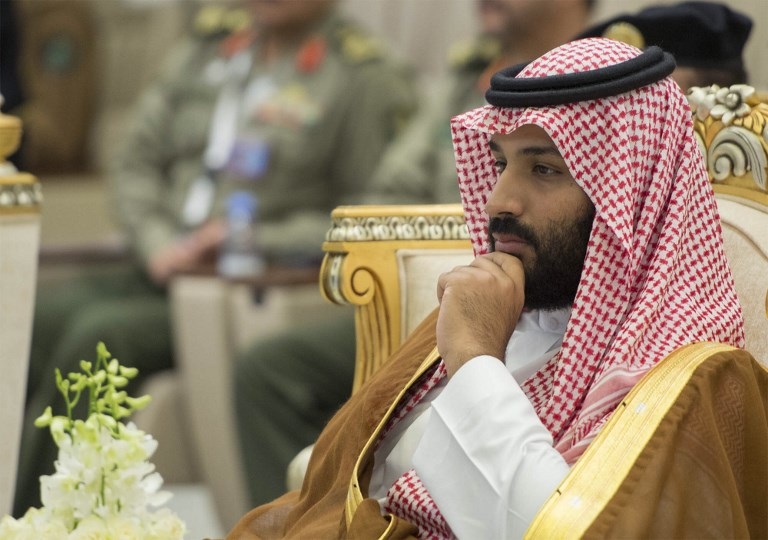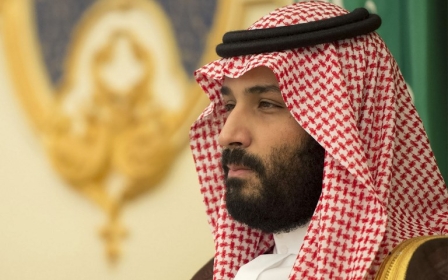A Saudi prince in Israel? An alliance born of failure

Israeli media is awash with rumours that a Saudi prince visited Israel last week and held consultations with senior Israeli officials. A few outlets and journalists have alleged that the prince in question was none other than Crown Prince Mohammed bin Salman (MBS, in common parlance), the most powerful figure in Saudi Arabia.
An Israeli source confirmed to me that there was a high-level Saudi visitor and said that it was possible that the prince met with Prime Minister Benjamin Netanyahu, though he couldn't confirm this definitively, nor could the source confirm that it was, in fact, MBS.
If the future Saudi king did indeed visit Israel, it would be a monumental development in Israel's relations with the Arab – and specifically Sunni - world. Though there have been such secret visits in the past (there was one, for example, in 2013), they've been intelligence chiefs or military officials. But never a future head of state.
Burgeoning bromance
There are obvious and less obvious implications of the visit. The obvious: it marks a heightening of the Saudi-Israel bromance which has seen a growing confluence of interests in their joint campaign to isolate Iran and other Shia forces like Syria's Assad and Hezbollah.
While Netanyahu has been quick to trumpet this as the breakthrough Israel has sought in Israel-Arab relations since the founding of the state in 1948, that is a vast overstatement. The joint understanding involves only one rather narrow issue, which is essentially Iran.
It does not necessarily have wider implications as Israel and the Trump administration have suggested. For example, both have boasted of a Saudi solution to the Israel-Palestine conflict.
In this scenario, the Saudis would somehow (through bribery, cajolery or worse) make the Palestinians accept a half-a-loaf peace agreement with Israel that gives Israel virtually all it wants, leaving the Palestinians with non-contiguous territorial Bantustans where their state should be.
The notion that the Saudis either will, or even can manipulate the Palestinians into accepting such a deal is a pipe-dream. But much of Israeli policy toward the Arabs both inside and outside Israel is built on similar forms of quicksand.
Saudi-Israeli pitfalls
One of the less obvious implications of this high-level meeting is that it marks the desperation of the Sunni-Israel alliance regarding Syria.
Six years of support for rebel groups including al-Qaeda and the Islamic State (IS) in their fight to topple Bashar al-Assad have come to naught. The counter-alliance of Russia-Hezbollah-Iran-Assad has bested every effort. Saudi dreams of a majority Sunni-run state in Syria are gone.
Israel's vision of a balkanised Syria in which it could dominate southern Syria and ensure permanent quiet in the Golan have also evaporated. So are its hopes that Assad would be defeated and, with him, Syria would forever relinquish claims to the Golan, which Israel conquered and occupied since 1967, in violation of international law. But now, Assad's claims are stronger than ever.
There are other failures to reckon with: the Saudi crown prince's personal decision to attack Yemen has resulted in 12,000 deaths, mass starvation and the worst cholera outbreak in the world right now. For a relatively small investment, the Iranians and their Houthi allies have withstood the Saudi bombardment.
In yet another adventure, the crown prince manipulated a major rupture with Qatar. All of the other Sunni states in the region lined up obediently behind their Saudi patron and supported the fool's errand of bringing the "willful" Qataris to heel. The rest of the world was left to scratch its head and wonder what got into the crown prince to foment a row over so little.
Later, we heard that the originator of this cracker-jack idea was none other than the Trump administration, which had brokered the call. Unfortunately, the Dealmaker himself wasn't there to hold both parties’ hands and the deal shattered into a thousand broken pieces. So much for the art of the deal.
It's telling that the Saudi response to the claim one of their own visited Israel was to counter with a claim that it wasn't a Saudi visiting, but a Qatari prince
On a side note, it's telling that the Saudi response to the claim one of their own visited Israel was to counter with a claim that it wasn't a Saudi visiting, but a Qatari prince. For all we know, both stories may be true since a Qatari prince was reported to have visited Israel in the past. The Qataris are willing to have relations with virtually anyone who can advance their interests, which is what riles up Crown Prince Mohammed bin Salman so much.
But given the Saudis propensity for media hoaxes (like the fake media report which started the current dispute), it's more than likely that the Saudi counter-claim is false and meant to divert the sting of disapproval throughout the Arab world.
Frustration fuelled alliance
During the Obama administration, it was clear that Israel and Saudi Arabia were thrown together at least in part because of their anger against US policy toward Iran. They wanted to rattle sabres and attack while Obama wanted to negotiate.
But with the new Trump administration, it's unclear how Washington will react to Saudi-Israeli proposals for actions against Iran. Israel has always wanted the US to attack Iran's nuclear facilities. At this point, I don't see any way Trump will agree to such a plan. The US president has his plate full with North Korea, while his former aide Steve Bannon has predicted war with China in the near future.
Given this Asian focus, I see no way Trump will relish a new Middle East military adventure. If so, that will frustrate both Israel and the Saudis and throw them even deeper into each other’s arms.
But as with everything concerning Trump, one must accept there are caveats. For a man prone to distraction, he could turn on a dime away from Asia and back to the Middle East. Our next foe may be Iran. But as I said, I doubt it.
That leaves Israel and its Saudi friends in the lurch. Without Big Brother Uncle Sam, it's difficult to mount a major military adventure against Iran. But that doesn't mean they won't organise lesser projects to harry and harass both Iran and its ally, Hezbollah.
While I'm not a betting man, when it comes to the Middle East, it's safe to say there is a war brewing for both these parties in the near future. That's probably what the meeting focused on last week. How to wreak maximum havoc on Iran & Co given the straitened circumstances under which Israel and its Sunni allies find themselves.
One key element of their agenda must be the destruction of the P5+1 nuclear agreement. Trump has all but signalled that he will jettison it at his first opportunity. If that happens, then all hell could break loose. The Iranians have threatened to resume uranium enrichment and the research programmes they had suspended under the deal.
That would give license to the war hawks in the region and in Washington to plan and hope for the worst. DC think tanks have already set their sights on resuming the role of Iran as bête noire in US foreign policy. These efforts represent the worst aspects of group-think and true hackery of the DC analyst-"intelligentsia", but such is the era of strange bedfollows and foreign policy pipe-dreams.
- Richard Silverstein writes the Tikun Olam blog, devoted to exposing the excesses of the Israeli national security state. His work has appeared in Haaretz, the Forward, the Seattle Times and the Los Angeles Times. He contributed to the essay collection devoted to the 2006 Lebanon war, A Time to Speak Out (Verso) and has another essay in the upcoming collection, Israel and Palestine: Alternate Perspectives on Statehood (Rowman & Littlefield).
The views expressed in this article belong to the author and do not necessarily reflect the editorial policy of Middle East Eye.
Photo: In August 2017, Saudi's Crown Prince Mohammed bin Salman attends a military parade by Saudi security forces in preparation for the annual Hajj pilgrimage to Mecca (AFP/Saudi Royal Palace)
This article is available in French on Middle East Eye French edition.
New MEE newsletter: Jerusalem Dispatch
Sign up to get the latest insights and analysis on Israel-Palestine, alongside Turkey Unpacked and other MEE newsletters
Middle East Eye delivers independent and unrivalled coverage and analysis of the Middle East, North Africa and beyond. To learn more about republishing this content and the associated fees, please fill out this form. More about MEE can be found here.







